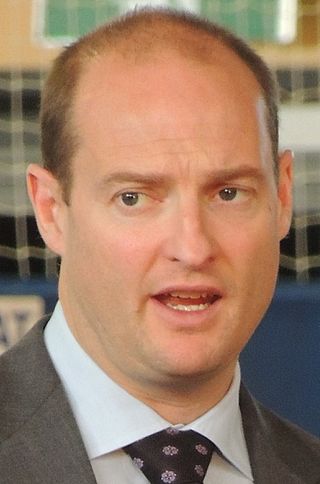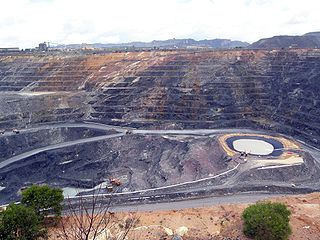
Rum Jungle is a locality in the Northern Territory of Australia located about 105 kilometres south of Darwin on the East Branch of the Finniss River. It is the site of a uranium deposit, found in 1949, which has been mined.

Thomas Richard Kenyon is a former Australian politician who represented the South Australian House of Assembly seat of Newland for the Labor Party from the 2006 election until his defeat in 2018. Kenyon left the Labor Party in 2021 to found the Family First Party.
The Peter Rawlinson Award is an annual Australian environment award by the Australian Conservation Foundation consisting of $3000 and a plaque made to individuals who have made an outstanding voluntary contribution to the Australian environment. It commemorates Dr Peter Rawlinson's contribution as an environmental campaigner and researcher. Rawlinson was an ACF Treasurer and Vice President and a biologist and conservationist who died while doing field work in Indonesia in 1991.

Nuclear weapons testing, uranium mining and export, and nuclear power have often been the subject of public debate in Australia, and the anti-nuclear movement in Australia has a long history. Its origins date back to the 1972–1973 debate over French nuclear testing in the Pacific and the 1976–1977 debate about uranium mining in Australia.

The prospect of nuclear power in Australia has been a topic of public debate since the 1950s. Australia has one nuclear plant in Lucas Heights, Sydney, but is not used to produce nuclear power, but instead is used to produce medical radioisotopes. It also produces material or carries out analyses for the mining industry, for forensic purposes and for research. Australia hosts 33% of the world's uranium deposits and is the world's third largest producer of uranium after Kazakhstan and Canada.

The Beverley Mine is Australia's third uranium mine and Australia's first operating in-situ recovery mine. It is located in South Australia in the gazetted locality of Wooltana about 35 km from Lake Frome at the northern end of the Flinders Ranges. It officially opened in 2001. The original Beverley uranium deposit was discovered by one of Bill Siller's companies in 1969 and was named after his wife—Beverley Siller.

Radioactive ores were first extracted in South Australia at Radium Hill in 1906 and Mount Painter in 1911. 2,000 tons of ore were treated to recover radium for medical use. Several hundred kilograms of uranium were also produced for use in ceramic glazes.
Four Mile is Australia's fifth uranium mine. It is sited in the Frome Basin in far north of the state of South Australia, around 600 kilometres (370 mi) north of the state capital, Adelaide. It is 10 kilometres (6 mi) from the existing Beverley uranium mine, where its uranium oxide product is produced. Construction of the mine commenced in late 2013 and the mine was officially opened in June 2014.

Radium Hill is a former minesite in South Australia which operated from 1906 until 1961. It was Australia's first uranium mine, years before the country's next major mines at Rum Jungle in the Northern Territory (opened in 1950), and the Mary Kathleen mine in Queensland (1958). The associated settlement which once housed up to 1,100 people is now a ghost town, largely abandoned and demolished. The former townsite and cemetery were provisionally listed on the South Australian Heritage Register on 24 August 2016. During its main period of production between 1954 and 1961 the mine produced nearly 1 million tonnes of davidite-bearing ore to produce about 860 tons of U3O8.

The uranium mining debate covers the political and environmental controversies of uranium mining for use in either nuclear power or nuclear weapons.

The Olympic Dam mine is a large poly-metallic underground mine located in South Australia, 550 km (340 mi) NNW of Adelaide. It is the fourth largest copper deposit and the largest known single deposit of uranium in the world. Copper is the largest contributor to total revenue, accounting for approximately 70% of the mine's revenue, with the remaining 25% from uranium, and around 5% from silver and gold. BHP has owned and operated the mine since 2005. The mine was previously owned by Western Mining Corporation.
Heathgate Resources Pty Ltd is a uranium mining company owned by the US-based nuclear company, General Atomics. Heathgate owns and operates the Beverley and Beverley North uranium mines which are located in the Frome Basin about 550 kilometres (340 mi) north of Adelaide in South Australia. In 2000, Heathgate Resources established Australia’s first operating in-situ recovery (ISR) uranium mine. The company is based in Adelaide and is a sponsor of the South Australian Museum. In the South Australian Parliament, Heathgate Resources has been represented by lobbying firms Hawker Britton and Barton Deakin Government Relations.
UCL Australia was an international campus of the University College London, located on Victoria Square in Adelaide, South Australia. It had three parts: the School of Energy and Resources (SERAus), the International Energy Policy Institute (IEPI) and a branch of UCL's Mullard Space Science Laboratory. UCL Australia described its university community as "welcoming, dynamic and influential." The campus closed in December 2017.
Richard Yeeles in an English-born Australian businessman and former senior South Australian public servant with interests in the resources sector, particularly uranium mining and processing.
Benjamin "Ben" Heard is a South Australian environmental consultant and an advocate for nuclear power in Australia, through his directorship of environmental NGO, Bright New World.

The Nuclear Fuel Cycle Royal Commission is a Royal Commission into South Australia's future role in the nuclear fuel cycle. It commenced on 19 March 2015 and delivered its final report to the Government of South Australia on 6 May 2016. The Commissioner was former Governor of South Australia, Kevin Scarce, a retired Royal Australian Navy Rear-Admiral and chancellor of the University of Adelaide. The Commission concluded that nuclear power was unlikely to be economically feasible in Australia for the foreseeable future. However, it identified an economic opportunity in the establishment of a deep geological storage facility and the receipt of spent nuclear fuel from prospective international clients.
Michels Warren is a South Australian public relations firm headquartered on Melbourne Street in North Adelaide and established in 1978. The company claims to be Adelaide's oldest Australian-owned PR consultancy, specialises in "building and protecting brands" and serves clients from public, private and not-for-profit sectors. In 2003 Phil Martin acquired the firm from former owners Daryl Warren and Janet Grieve, merging with Maverick Media & PR. In 2013 the agency employed 14 staff. The firm works closely with Keito Events, which is managed by former Michels Warren employee, Kate Abrahams.
The nuclear industry in South Australia is focused on uranium mining, milling and the export of uranium oxide concentrate for use in the production of nuclear fuel for nuclear power plants. The state is home to the world's largest known single deposit of uranium, which is worked by BHP at the Olympic Dam mine.

Kyra Reznikov is a South Australian commercial lawyer and Special Counsel at legal firm Finlaysons.










